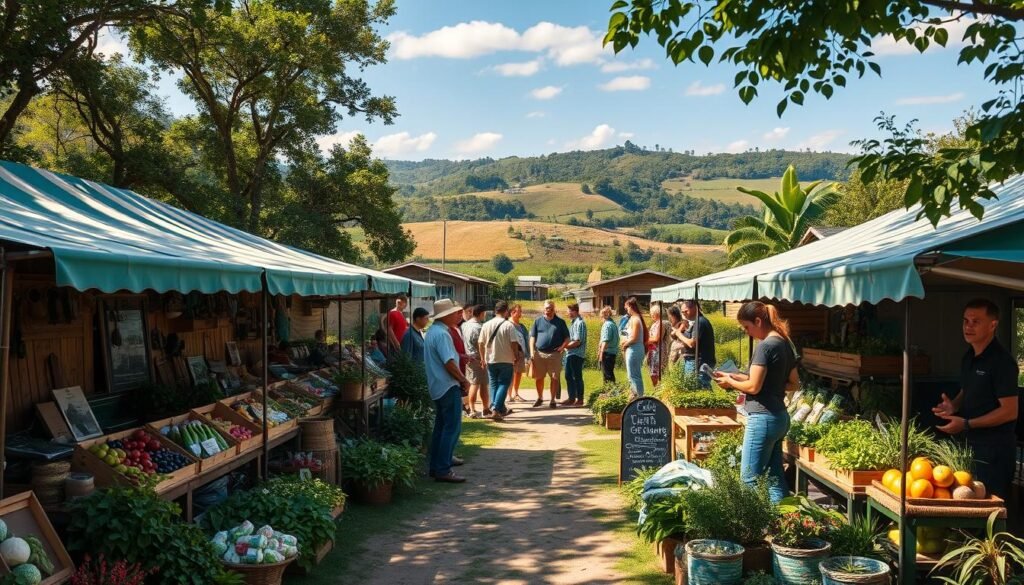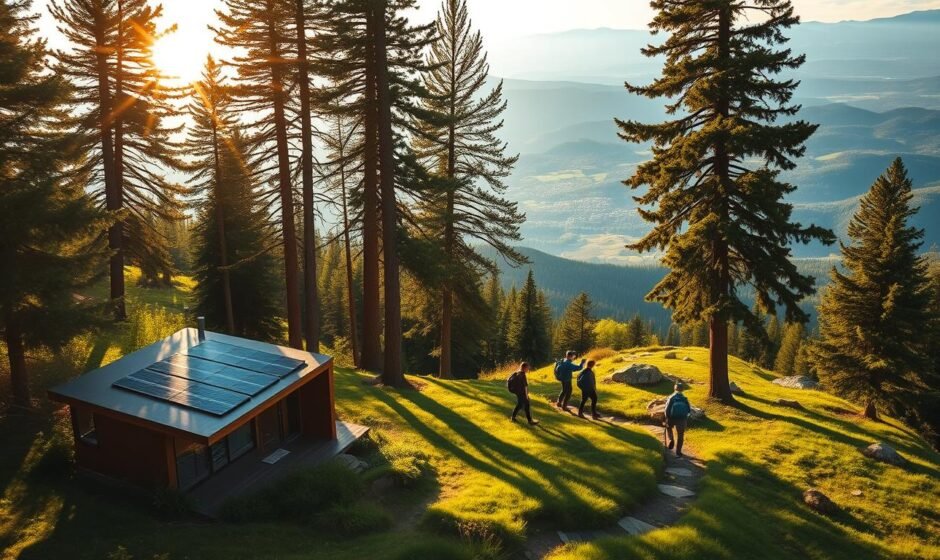Did you know 72% of people think sustainable travel is key for their holidays? More and more people want to travel in a way that’s good for the planet. These new travel options help us connect with nature and local communities in a meaningful way.
Choosing to travel sustainably is important today. The travel world is changing, with more focus on being green. Whether it’s where you stay or how you get there, making eco-friendly choices can make a big difference.
Key Takeaways
- Sustainable travel is increasingly important to modern travellers.
- Eco-friendly holiday alternatives can reduce the carbon footprint significantly.
- Green accommodation and travel choices can enhance holiday experiences.
- Choosing sustainable options fosters a deeper connection with nature and local cultures.
- The travel industry is adopting more sustainable practices to support the environment.
Introduction to Sustainable Travel
Sustainable travel means making choices that care for the environment and local people. It’s about reducing harm to nature and boosting local economies. More places are going green, and people are choosing eco-friendly options.
The climate crisis is changing the Mediterranean, with hotter summers and sea level rise. Places like Spain, Italy, and Greece are seeing big changes. But, Northern and Central Europe are becoming more popular for their cooler weather.
Helping local economies by eating local food and staying in green places is key. Off-grid spots use solar power and collect rainwater, cutting down on fossil fuel use. Walking instead of driving also cuts down on carbon emissions and keeps us healthy.
Nature-based tourism is on the rise, focusing on conservation and culture. Activities like beach cleans help protect marine life. Eco-labels like TourCert and Viabono help find sustainable travel options.
Choosing sustainable travel options is more important than ever. It’s about making choices that help the planet and support local communities. By doing this, we can keep travel destinations beautiful for the future.
Eco-friendly Accommodation Options
Choosing the right place to stay can really help the planet. Green hotels are a big step towards being more sustainable. They use less energy, save water, and cut down on waste.
More people now want to stay in places that are good for the environment. You can find ‘eco-friendly hotels’, ‘eco lodging’, and ‘natural hotels’ online. Sites like Ecobnb help you find places that care about the planet.
If you care about the environment, you might be willing to pay more for your stay. This helps support green practices and makes the travel industry better. For example, The Good Hotel London was moved by boat, showing its commitment to green transport.
Eco-lodges are another great choice for those who love nature. They’re often in beautiful places and let you do things that help the environment. These places use smart energy-saving systems and teach guests about being green.
A new trend is agritourism, where you stay on a farm and help with the work. Places like Hoe Grange Farm in Derbyshire use green energy. It’s a way to learn about farming and help the planet at the same time.
| Hotel Name | Sustainable Practice | Location |
|---|---|---|
| The Green House Hotel | Grade-II Victorian villa, historical preservation | Bournemouth |
| The Scarlet Hotel | Uses only fresh Cornish ingredients | Cornwall |
| Qbic London City | On-site bike rentals for eco-friendly transportation | London |
| Titanic Hotel | Zero-waste-to-landfill establishment | Liverpool |
By picking green hotels, eco-lodges, and agritourism, you help the planet. You also support businesses that care about the environment. These options are a responsible way to see the world, whether in the UK or abroad.
Environmentally Conscious Travel Choices
Traveling in an eco-friendly way means choosing wisely for the planet and local people. Pick places known for caring for the environment, like Costa Rica. There, over 25% of the land is protected, showing their commitment to nature.
Your ethical travel experiences can make a big difference. Stay in places that use less waste and energy. This can cut down on waste by 50% and energy use by 30%.
Choose activities that help protect nature. Places like Patagonia show how tourism can be done right. They’ve cut down environmental harm by 60%.
More people want to travel in a green way. The eco-tourism market is set to grow fast. Now, 70% of travelers want to stay in places that care for the environment.
By choosing wisely, you help the planet. Your travel choices can make a big difference. They make your trip better and help the planet for the future.
Transportation Alternatives for a Greener Journey
Exploring our beautiful planet sustainably is now easier, thanks to eco-friendly transport options. Choosing *train and tram travel* reduces your carbon footprint more than flying or driving.
- Carbon Emissions Reduction: *Short travel distances* help cut CO₂ emissions, supporting eco-friendly “micro-tourism”. *Trains* using green electricity are very energy efficient, almost CO₂-free.
- Low-Emission Vehicles: *Car sharing* and *electric vehicles* are getting more popular, helping the environment. Carpooling also cuts down emissions by reducing the number of vehicles on the road.
- Zero-Emission Options: *Cycling and bike rentals* are great for exploring new places without harming the environment. They’re perfect for urban areas where pollution is a big issue.
“Transportation emissions in terms of grams of CO₂ per passenger-kilometre show that *train and tram travel* are better for the planet than flying or driving. Using these transport options is good for the planet and our health.”
Using low-emission methods like walking or cycling also reduces your ecological footprint. This makes your travel more sustainable, allowing you to enjoy your journey without harming the environment.
| Mode of Transport | CO₂ Emissions (g/pkm) |
|---|---|
| Train | 17 |
| Tram | 22 |
| Car (single occupant) | 130 |
| Airplane | 285 |
In places like Bath and Bristol, bike rentals or car-sharing are very useful. Local train lines and bus routes encourage sustainable travel. This trend shows tourism’s growing commitment to being more eco-friendly.
Modern Eco-Friendly Holiday Alternatives
Modern eco-friendly holidays are changing how we travel. They mix being green with ease. For example, the UK has over 30,000 electric car charging points. This makes driving electric cars easy for those who care about the planet.
More places are using green energy too. This can cut energy use by up to 30%.
The UK is full of eco-friendly spots. It has about 2,000 national parks and heritage sites. These places are great for hiking and cycling, which can reduce carbon emissions by 70%.
Cities also have green spaces. There are about 18,000 of them for everyone to enjoy. They’re perfect for outdoor activities.
Traveling can also be green. Flying is a big source of CO2 emissions, but you can offset this. Bus travel is even better, cutting emissions by 45% per passenger.
Helping local businesses is also key. Spending money locally can keep up to 70% of it in the community. This supports growth and sustainability.
Initiatives like food donation can also help. For example, Linwater Caravan Park can reduce food waste by 30%. This makes sure resources are used well.
Choosing eco-friendly holidays is good for the planet. It makes your trip better and helps the environment. By picking green travel and staying in eco-friendly places, you help protect our planet for the future.
Sustainable Vacation Options in the UK
Looking for a green getaway in the UK? You’re in the right place. The country is full of eco-friendly places to stay and things to do. From stays in national parks and forests to coastal and rural retreats, there’s something for everyone.

The Zetter Hotel is a unique spot. It has its own water supply, cutting down on plastic bottles. The Victoria Inn lets guests offset their carbon by donating to the World Land Trust. Battlesteads Hotel grows most of its food on-site, reducing its carbon footprint by a lot.
For a nature-filled stay, try Hex Cottage. It’s on a huge estate with lots of trees and wildflowers. Kudhva campsite is off-grid, using solar power in a quarry. Brooke House Woods offers luxury glamping with a focus on sustainability.
Loveland Farm is serious about being green. Its pods run on solar power, and it uses recycled woodchip for heating. Silo is the UK’s first zero-waste restaurant, turning leftovers into compost fast. Angela’s of Margate and Carters of Moseley focus on local, low-carbon food.
| Accommodation/Location | Sustainable Practice |
|---|---|
| The Zetter Hotel | Self-sustaining water supply, no plastic bottles |
| Victoria Inn | Carbon offset donations to World Land Trust |
| Battlesteads Hotel | On-site herb, salad, and vegetable growing, significantly reduced carbon footprint |
| Hex Cottage | Extensive tree planting and wildflower sowing |
| Loveland Farm | Solar-powered pods, recycled woodchip biomass heating |
| Silo | Zero-waste restaurant, rapid composting of leftovers |
| Angela’s of Margate | Fresh, local seafood sourcing to minimise food miles |
| Brook House Woods | Locally sourced wood glamping retreats, composting toilets |
| Carters of Moseley | Low carbon footprint, local ingredient sourcing |
The UK is leading the way in eco-tourism. With more people wanting green stays and activities, the future looks bright. Whether you’re into national parks and forests or coastal retreats, your green holiday is waiting.
Responsible Tourism Destinations Worldwide
Promoting local culture through responsible tourism is key to sustaining global destinations. Costa Rica leads this movement with its eco-resorts, like Rancho Margot, which serves as a sustainable learning centre. In Norway, the Fjord region uses hybrid energy ships, cutting carbon emissions significantly. Svart aims to be the world’s first energy-positive hotel, aiming to generate 160% of its energy needs over 50 years.
Kaikoura in New Zealand is famous for its sustainable whale-watching tours. These tours focus on minimal disruption to marine life. The Bolivian Amazon’s Chalalán Ecolodge highlights biodiversity, with 11% of all plant and animal species.
Libearty Bear Sanctuary in Romania houses over 100 rescued brown bears in a vast oak forest. This promotes local conservation efforts. In Bhutan, the tourism model supports Gross National Happiness by offsetting agricultural losses caused by wildlife.
Namibia’s San people share their 40,000 years of survival skills in the Kalahari Desert. This provides unique cultural insights. Across Portugal’s Azores, eco-tours encourage sustainable exploration of the islands’ distinct ecosystems.
Tasmania’s Wukalina Walk offers a 34km trek, engaging visitors with 10,000 years of Aboriginal history. The Ol Pejeta Conservancy in East Africa is the continent’s largest black rhino sanctuary. It supports local communities through budget-friendly safaris and conservation projects.
Fiji leads coral reef health initiatives, with resorts like Castaway Island Fiji and Jean-Michel Cousteau Resort spearheading coral planting projects. Volunteer opportunities in USA national parks support conservation efforts, requiring a commitment of at least 32 hours with some compensated positions available.
Global destinations also embrace sustainability trends. Valencia, Spain, aims to generate 100% of its electricity from renewable sources by 2025. It boasts 500 hectares of green spaces and 200 km of bike lanes. In the Dutch Caribbean, Saba produces 35-40% of its power from a solar park and utilises a hydroponics farm that uses 80% less water. Singapore, certified by the Global Sustainable Tourism Council, plans to quadruple solar energy deployment by 2025 and cut landfill waste by 20% by 2030.
From Belfast’s leap in the Global Destination Sustainability Index to Panama’s investment in its Indigenous cultures and sustainable tourism master plan, these destinations illustrate the power and the future of responsible tourism. Visitors are increasingly choosing places that prioritise promoting local culture, supporting community projects, and conservation-focused travel.
Ways to Minimise Your Holiday’s Carbon Footprint
It’s important to adopt sustainable travel practices. About two-thirds of greenhouse gas emissions come from our daily choices. By choosing eco-friendly holidays, you can help reduce carbon footprint. Here are some ways to cut down your holiday’s carbon footprint:
- Choose destinations closer to home to cut down on long-haul flights, which are a major contributor to harmful greenhouse gases.
- Opt for public transport or electric vehicles whenever possible, as the global transport system generates approximately 15% of total greenhouse gas emissions.
- Select eco-friendly accommodations committed to sustainability, such as those that have earned green certifications.
- Engage in sustainable activities that have minimal environmental impact, like hiking or cycling instead of motorised tours.
- Avoid single-use plastics by carrying reusable water bottles and bags. Each year, approximately 5 trillion plastic bags are used, with many ending up in our oceans.
| Transportation Mode | Emissions (kg CO2 per Passenger) | Pros | Cons |
|---|---|---|---|
| Airplane | 255 | Fast, convenient | High greenhouse gas emissions |
| Train | 41 | Lower emissions, scenic | Slower, less accessible in remote areas |
| Electric Vehicle | 0* | Zero direct emissions, flexible | Charging infrastructure, higher initial cost |
*Note: Emissions depend on the electricity grid’s energy source.
By focusing on these aspects, you can make your holidays more eco-friendly. This helps reduce carbon footprint and promotes a planet-friendly lifestyle.
Ethical Travel Experiences That Make a Difference
Ethical travel lets you dive into activities that go beyond usual tourist spots. Wildlife Conservation Tours are a great way to help protect endangered animals. By joining these tours, you help a lot with conservation.
Community-based tourism is another great choice. It can boost local income by up to 30% more than regular tourism. When you spend money with local communities, you help them grow and thrive.
Voluntourism combines volunteering with travel. It lets you help with community projects. About 70% of travellers want to spend more on sustainable travel. And about 40% of tourists choose to travel responsibly.
| Travel Type | Benefits |
|---|---|
| Wildlife Conservation Tours | Support endangered species, contribute to conservation |
| Community-Based Tourism | Increase local income, foster community growth |
| Voluntourism | Participate in welfare projects, sustainable contribution |
People who help with community projects on their trips are 50% more likely to come back. These ethical travel experiences make your trip unforgettable and truly meaningful.
Benefits of Choosing Sustainable Travel
Sustainable travel does more than just protect the environment. It makes your trip better and helps local communities. By choosing eco-friendly travel, you help keep cultures and habitats alive and support local businesses.
Staying in sustainable places means using less energy and water. This helps reduce your carbon footprint. Tourism, including flying, is a big source of emissions. But, choosing trains can cut emissions by 80%.
Supporting local tourism boosts the local economy. It also deepens your cultural experience and helps the community. Ethical wildlife tourism ensures animals are treated well and helps protect nature.
Using reusable items like water bottles and cutlery reduces waste. Staying in eco-certified places shows you care about the planet. These places often serve fresh, organic food, reducing food miles.
Joining eco-tours and conservation projects makes your trip meaningful. Simple actions like turning off lights and taking shorter showers help the environment. Learning about sustainable travel ensures future generations can enjoy these places too.
Here is a comparative breakdown of tourism’s CO₂ emissions sources:
| Source | CO₂ Emissions Contribution |
|---|---|
| Aviation | 40% (3.2% of total emissions) |
| Car Travel | 32% (2.5% of total emissions) |
| Accommodation | 21% (1.7% of total emissions) |
Sustainable tourism promotes fair wages and social development. By choosing sustainable travel, you help protect destinations’ cultures and nature. These choices may cost more upfront but offer long-term benefits and better travel experiences.
Tips for Planning an Eco-Friendly Holiday
Planning an eco-friendly holiday starts with choosing green destinations. Places like Costa Rica and Bhutan are great for this. They focus on eco-tourism and conservation. Also, pick hotels that use renewable energy and recycle.
When packing, think about eco-friendly items. Reusable water bottles and bamboo cutlery can reduce plastic waste. Did you know most wrapping paper isn’t recyclable? Sustainable alternatives help the environment.
Choosing how you travel is key. Trains are better than planes, which can pollute a lot. If you must fly, buy carbon offsets. These steps lessen your impact on the environment.
Reducing waste is vital. Bring your toiletries and avoid single-use plastics. Food waste increases by 25% during holidays. Choose local, seasonal foods to help.
Responsible tourism benefits the planet and enriches your trip. Support local artisans and community-based tourism. Eco-friendly experiences like wildlife sanctuaries offer unique memories.
Here’s a comparison of holiday practices and their impact:
| Practice | Environmental Impact | Sustainable Alternative |
|---|---|---|
| Traditional Wrapping Paper | Non-recyclable, significant waste | Use recyclable or fabric wrap |
| Air Travel | High carbon emissions | Train travel, carbon offsets |
| Single-use Plastics | Major contributor to plastic waste | Reusable products, bamboo cutlery |
| Mass-Produced Souvenirs | High waste, low community benefit | Local, artisan-made products |
Follow these tips and Research and Choose Green Destinations for your holiday. You’ll make a positive impact and enjoy a responsible trip. Every effort counts towards a greener future. Start planning your eco-friendly holiday today.
Support Sustainable Suppliers and Businesses
When you choose sustainable business practices and work with eco-friendly suppliers, you help save our planet. By picking companies that care about the environment, you show others it’s important. This can inspire more businesses to go green.
In the UK, 47% of companies have a green policy. For example, Mayfield’s decking is made from up to 80% recycled materials. It’s also 100% recyclable, showing a big step towards reducing waste.
“91% of the public wishes to see brands demonstrate their actions to support the planet.”
Did you know 25% of travellers want more green places to visit? By looking for eco-friendly suppliers, you help meet this demand. This can encourage more businesses to offer green options. Also, 87% of travellers want to travel more sustainably, and 61% say the pandemic made them think more about it.

Supporting companies like British Airways can help too. They aim to be carbon neutral by 2050. Using Sustainable Aviation Fuel can cut emissions by 80%, showing a great example for the aviation world.
Small actions can make a big difference. Turning off the tap while brushing teeth can save up to 32 gallons of water daily. These actions can add up and help protect our planet.
By backing sustainable businesses and suppliers, you join a global effort to protect our environment. Your choices can lead to big changes and inspire a more eco-friendly travel industry.
How Technology Enhances Sustainable Travel
Travel demand is set to grow by 5.8% each year until 2032. It’s vital to use technology to keep travel green. Using apps for green travel tips is a big help. These apps give tips on eco-friendly travel and help book trips that are good for the planet.
For example, Renewable Vibes shows how to travel green. It suggests choosing places that use renewable energy and are eco-friendly. Also, booking with eco-conscious platforms lets travellers pick options that help the environment.
Electric microgrids in remote areas are another tech boost for green travel. They cut down on fossil fuel use and keep energy sustainable even in hard-to-reach places.
Travel tech goes beyond booking and energy. It includes immersive experiences like virtual reality (VR) and augmented reality (AR). These technologies offer real-life experiences that connect us to places without the need for physical travel. People like Jeff Colhoun use drones to give travel previews, reducing the need for actual trips.
Another big step is the use of carbon offset programs in travel booking. These programs let travellers easily support projects that cut down greenhouse gas emissions. This way, they can lessen the environmental impact of their travels.
Apps for green travel tips and tech integrations are making travel more sustainable.
- Minimise the carbon footprint
- Enhance travel experiences through VR/AR
- Support eco-friendly accommodations
- Promote regenerative tourism
- Facilitate carbon offset investments
Travel companies using these tech innovations meet the growing demand for eco-friendly travel. Asia Pacific and the Middle East are leading in tourism growth. It’s key to use tech to avoid overcrowding, cut emissions, and reduce waste.
More and more people, 80%, see sustainable travel as important. By using sustainable travel tech, we can make tourism better for the planet. It’s about promoting travel that’s both high-quality and eco-friendly.
Impact of Sustainable Travel on the Environment
The environmental impact of travel has been a big concern for years. But, sustainable travel is showing great promise. It helps save natural resources, cuts down on carbon emissions, and protects wildlife.
The German government’s €9 monthly travel ticket is a great example. It was in place from June to August 2022. It led to more people using trains, which helped protect the climate. This shows how good travel policies can help the environment.
Places like Costa Rica and the Azores are leading in sustainable travel. They have set aside lots of land for nature and got special certifications. Costa Rica, for example, has almost 30% of its land protected. This shows their dedication to wildlife and nature.
Let’s look at some key places and their green efforts:
| Destination | Initiative | Impact |
|---|---|---|
| Costa Rica | 30% protected areas | Preserved biodiversity and habitats |
| Azores | Sustainable tourist certification | Enhanced ecosystem conservation |
| Singapore | 300 acres of new parks | Increased greenery and recreational spaces |
| Scotland | Carbon-neutral target by 2030 | Reduction in carbon emissions |
| Valencia, Spain | 100% renewable energy goal by 2024 | Decreased reliance on fossil fuels |
These examples show that sustainable travel is key to a healthier planet. It’s not just about leaving a smaller footprint. It’s about helping the planet. By choosing green options, you’re part of the positive change.
Conclusion
Choosing eco-friendly holidays and sustainable travel is a big step towards better tourism. It helps the environment and local communities. Ethical Consumer shows progress, with Fairbnb giving half of their fees to local projects. Canopy & Stars aims to be net zero by 2030.
Independent Hostels UK leads in carbon management, showing the way forward. Yet, challenges remain. Only a small part of Airbnb’s listings are truly eco-friendly. Most are managed by big property owners.
Companies like TUI must fix their ethical issues, like promoting bad animal parks. But, the industry is changing. The GSTC offers training for sustainable tourism, seen as key by the UN.
Supporting sustainable travel is key for a greener future. We can do this by picking eco-friendly places to stay and joining local projects. New tech and awareness can lead to a better travel world. Every traveller’s actions can make a big difference, helping us move towards a more sustainable tourism.
FAQ
What are green hotels and eco-lodges?
What is agritourism?
How can I minimise my carbon footprint while travelling?
Are there any sustainable vacation options in the UK?
What are some responsible tourism destinations worldwide?
How can I plan an eco-friendly holiday?
What role does technology play in sustainable travel?
What is voluntourism?
How does sustainable travel benefit the environment?
What are ethical travel experiences?
Why should I support sustainable suppliers and businesses?
What are the benefits of choosing sustainable travel?
What are some tips for green holiday planning?
How can sustainable travel impact local communities?
Source Links
- 40 Ways to Be More Eco Friendly in 2025 | GreenMatch – https://www.greenmatch.co.uk/blog/how-to-be-more-eco-friendly
- How to travel better: a beginner’s guide to sustainable travel in 2023 and beyond – https://www.nationalgeographic.com/travel/article/how-to-travel-better-a-beginners-guide-to-sustainable-travel-in-2023-and-beyond
- Would you like to travel sustainably? – https://uniquehideaways.com/stories/268/sustainable-travel-how-to-be-an-eco-friendly-visitor
- Sustainable Tourism – Adapting to Climate-Induced Holiday Trends – https://transition-pathways.europa.eu/articles/sustainable-tourism-adapting-climate-induced-holiday-trends
- Sustainable travel: how it works! – https://www.hausvoneden.com/food-travel/sustainable-travel-tips/
- Eco-friendly hotels explained: Why they matter – https://www.glion.edu/magazine/eco-friendly-hotels-explained/
- UK’s best eco friendly hotels & restaurants – https://www.roughguides.com/articles/uks-best-eco-friendly-hotels-and-restaurants/
- Eco Friendly Tourism: A new era of conscious travel – https://lesroches.edu/blog/eco-friendly-tourism-a-new-era-of-conscious-travel/
- 14 sustainable travel companies you can feel good about booking with – https://www.timeout.com/travel/sustainable-travel-companies
- Tips for Climate-friendly Travel – atmosfair – https://www.atmosfair.de/en/green_travel/climate-friendly_travel/
- Sustainable travel | National Trust – https://www.nationaltrust.org.uk/visit/sustainable-travel-to-the-places-in-our-care
- How to have a sustainable holiday – https://www.verdantleisure.co.uk/our-journal/how-to-have-a-sustainable-holiday/
- 10 Ways to Have an Eco-Conscious Family Holiday | Linwater Caravan Park – https://www.linwater.co.uk/10-ways-to-have-an-eco-conscious-family-holiday/
- Top eco-friendly places for a green getaway in 2024 – https://www.visitengland.com/zero-waste-restaurants-eco-friendly-sustainable-holidays
- Eco-friendly hotels and holiday homes – https://www.secretplaces.com/collection/eco-friendly-hotels-and-holiday-homes
- 12 of the best sustainable trips – https://www.lonelyplanet.com/articles/sustainable-travel-experiences
- 10 sustainable travel destinations to visit in 2024 – https://www.bbc.com/travel/article/20240109-10-destinations-welcoming-sustainable-travellers-in-2024
- How to have an environmentally-friendly holiday season – https://www.unep.org/news-and-stories/story/how-have-environmentally-friendly-holiday-season
- 10 Sustainable Holiday Tips for a Greener Season – Tradebe – https://www.tradebe.com/10-sustainable-holiday-tips-for-a-greener-season/
- Travel responsibly – https://www.worldnomads.com/responsible-travel
- Make Travel Matter Campaign — Travel Matters – https://www.travelmatters.co.uk/make-travel-matter
- Embracing sustainable travel: top tips to travel more sustainably | Action Sustainability – https://www.actionsustainability.com/resources/embracing-sustainable-travel-top-tips-to-travel-more-sustainably/
- Sustainable Travel: 8 Reasons to Book Sustainable Tourism – https://www.earth-changers.com/purpose/sustainable-travel-whats-in-it-for-you-8-reasons-to-book-sustainable-tourism/
- 16 Sustainable Travel Tips and How They Benefit You – Trip Canvas – https://www.aaa.com/tripcanvas/article/benefits-of-sustainable-travel-CM752
- 10 Sustainable Holiday Tips for 2024 | EcoBlvd – https://www.ecoblvd.com/blogs/news/10-eco-friendly-holiday-tips-for-2024?srsltid=AfmBOoqaetC7YWZF-crNxFdZoiZB0qnXvQF-77t4qdCZM1o1OEZF9XZd
- 10 Ways to Travel Sustainably, Top Green Destinations & Smart Tips – https://explorerspassage.com/chronicles/sustainable-travel-guide/
- 30+ Eco-Friendly Tips For A Sustainable Holiday – GreenCitizen – https://greencitizen.com/blog/sustainable-holiday-tips/
- 5 Ways to Become a Sustainable Tourism Destination – https://themayfieldgroup.co.uk/5-ways-become-sustainable-tourism-destination/
- Practices to adopt to promote Sustainable Tourism? – https://technominetravelsolutions.co.uk/blogsdetail/sustainable-tourism
- How Cutting-Edge Sustainable Travel Technology Is Changing Tourism – https://www.forbes.com/sites/geoffwhitmore/2024/09/17/how-cutting-edge-sustainable-travel-technology-is-changing-tourism/
- How manual tonneau covers enhance truck security | London Daily News – https://www.londondaily.news/the-future-of-travel-how-technology-is-revolutionising-the-tourism-industry/
- Sustainability in Travel : How travel technology drives eco-conscious tourism | Travel Technology Blog | Tourism Technology Trends – Pratra – https://www.pratra.com/blog/sustainability-in-travel-how-travel-technology-drives-eco-conscious-tourism
- How is sustainability influencing the travel and tourism industry | Mintel – https://www.mintel.com/insights/travel-and-tourism/how-is-sustainability-influencing-the-travel-and-tourism-industry/
- What is Sustainable Travel and Tourism – https://oneplanetjourney.com/what-is-sustainable-travel/
- Fairbnb and other alternatives to Airbnb – https://www.euronews.com/travel/2022/08/15/looking-for-a-homestay-holiday-here-are-five-ethical-alternatives-to-airbnb
- What is Sustainable Tourism? – https://www.gstcouncil.org/what-is-sustainable-tourism/
- 9 Sustainable Christmas Tree Ideas for Eco-friendly Celebrations – https://www.implasticfree.com/sustainable-christmas-tree/




